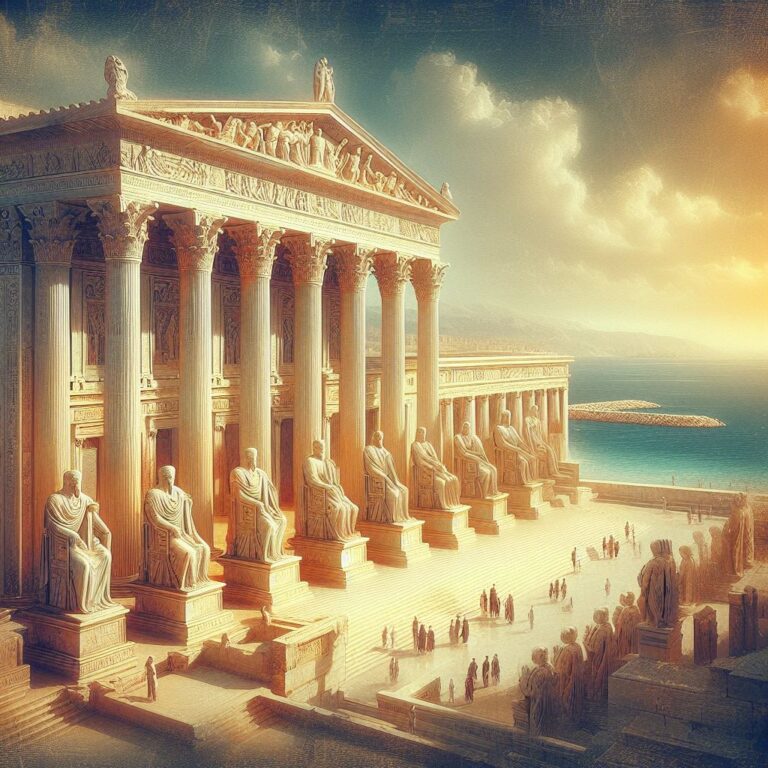The Library of Alexandria, a beacon of knowledge in the ancient world, has haunted imaginations for centuries. Its enigmatic demise, shrouded in fire and forgotten battles, sparks endless intrigue. While its exact fate remains a tantalizing mystery, various theories weave competing narratives, each piece attempting to fit into the fragmented puzzle of the library’s final chapter. Let’s embark on an intellectual journey, delving into the detailed accounts of its potential demise, illuminating the lives and works of its revered scholars, and piecing together the legacy of this irreplaceable treasure trove.
Whispers of Flames: Theories of Destruction
The library’s disappearance remains a historical enigma, its story fragmented like a papyrus scroll ravaged by time. Several prominent theories vie for attention, each attempting to explain the events that engulfed this intellectual haven in darkness.
The Accidental Inferno:
One prevalent theory suggests an unintentional catastrophe sparked by Julius Caesar’s siege of Alexandria in 48 BC. Accounts mention collateral damage to the city, including parts of the harbor. Some historians believe stray arrows or sparks from the conflict could have ignited the library, fueled by the flammable papyrus scrolls. However, skepticism clouds this narrative. Caesar, a renowned scholar himself, would likely have actively protected such a treasure trove. Moreover, archaeological evidence unearthed within the supposed library’s location reveals no definitive signs of fire damage.
The Deliberate Purge:
Another narrative attributes the library’s demise to deliberate destruction by early Christians in the 4th century AD. This version often paints the act as a purge of “pagan” knowledge, fueled by religious fervor. However, evidence supporting this claim is scarce. Historical records suggest tolerance among early Christians towards ancient scholarship, even incorporating elements of Greek philosophy into their own theology. Additionally, archaeological finds reveal continued intellectual activity in Alexandria well into the Christian era.
The Gradual Decline:
Some scholars propose a more gradual decline rather than a singular devastating event. This theory suggests that the library’s significance waned over centuries due to neglect, political instability, and the rise of rival institutions like Pergamon. Funding dwindled, scrolls deteriorated, and eventually, the library faded into oblivion. While lacking the drama of a sudden demise, this explanation aligns with the documented historical decline of Alexandria’s influence and the inevitable decay of physical materials.
The Mythical Catastrophe:
Several narratives embellish the library’s destruction, often bordering on the fantastical. Tales whisper of Arab conquerors deliberately burning the library in the 7th century AD, fueled by religious intolerance. However, historical records from this period paint a more nuanced picture, suggesting peaceful knowledge exchange between scholars of different faiths. Others even whisper of hidden chambers and secret passages where a portion of the library’s collection was saved, waiting to be rediscovered. While intriguing, these stories lack concrete evidence and are best classified as cultural folklore.
Beyond the Smoke: Illuminating Scholarly Brilliance
Stepping away from the theories of destruction, we delve into the heart of the library itself, encountering the brilliant minds who inhabited its halls and the invaluable works they preserved.
The Guardians of Knowledge:
Democritus: Nicknamed “the Laughing Philosopher,” Democritus’ atomic theory laid the foundation for modern scientific thought. His scrolls, meticulously copied and preserved in the library, offered revolutionary insights into the universe’s composition.
Euclid: Known as the “Father of Geometry,” Euclid’s “Elements” revolutionized mathematics, its logical rigor and geometric principles forming the bedrock of mathematical education for centuries. His work, carefully housed in the library, illuminated the world with the power of mathematical reasoning.
Hypatia: A renowned mathematician, astronomer, and philosopher, Hypatia tragically met her demise during religious unrest. Her groundbreaking work in celestial mechanics and geometry, preserved in the library, left an indelible mark on science and philosophy.
Treasures Lost, Lessons Learned:
The Library of Alexandria’s collection encompassed a vast spectrum of knowledge, from historical chronicles and medical treatises to literary masterpieces and philosophical discourses. Its loss can be likened to a lighthouse extinguished in the midst of an intellectual storm, plunging the world into relative darkness for centuries.
Echoes of Knowledge:
While the physical library may be lost, its impact resonates throughout history. Its legacy lies not just in the specific texts it housed, but in the spirit of intellectual inquiry and knowledge preservation it embodied. The library serves as a powerful reminder of the importance of protecting our intellectual heritage, fostering open dialogue, and relentlessly pursuing the light of knowledge.
The Search Continues: Unearthing Hidden Secrets
The physical location of the library remains a mystery, though archaeological excavations in Alexandria continue to unearth invaluable clues. Fragments of pottery, ostraca with scribbled notes, and even remnants of possible scroll storage spaces offer tantalizing glimpses into the past. Each discovery, like a flickering candle in the darkness, sheds light on the library’s existence.
Check out more articles like this at History Archives – Topic In One Article
